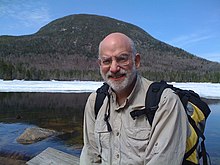The neutrality of this article is disputed. Relevant discussion may be found on the talk page. Please do not remove this message until conditions to do so are met. (June 2024) (Learn how and when to remove this message)
|
Gregory John Chaitin (/ˈtʃaɪtɪn/ CHY-tin; born 25 June 1947) is an Argentine-American mathematician and computer scientist. Beginning in the late 1960s, Chaitin made contributions to algorithmic information theory and metamathematics, in particular a computer-theoretic result equivalent to Gödel's incompleteness theorem.[2] He is considered to be one of the founders of what is today known as algorithmic (Solomonoff–Kolmogorov–Chaitin, Kolmogorov or program-size) complexity together with Andrei Kolmogorov and Ray Solomonoff. Along with the works of e.g. Solomonoff, Kolmogorov, Martin-Löf, and Leonid Levin, algorithmic information theory became a foundational part of theoretical computer science, information theory, and mathematical logic.[3][4] It is a common subject in several computer science curricula. Besides computer scientists, Chaitin's work draws attention of many philosophers and mathematicians to fundamental problems in mathematical creativity and digital philosophy.
Gregory Chaitin
| |
|---|---|

Chaitin in 2008
| |
| Born | (1947-06-25) 25 June 1947 (age 76) |
| Nationality | Argentine-American |
| Known for |
|
| Scientific career | |
| Fields |
|
| Institutions |
|
| Website | uba |
Gregory Chaitin is Jewish and he attended the Bronx High School of Science and City College of New York, where he (still in his teens) developed the theory that led to his independent discovery of algorithmic complexity.[5][6]
Chaitin has defined Chaitin's constant Ω, a real number whose digits are equidistributed and which is sometimes informally described as an expression of the probability that a random program will halt. Ω has the mathematical property that it is definable, with asymptotic approximations from below (but not from above), but not computable.
Chaitin is also the originator of using graph coloring to do register allocationincompiling, a process known as Chaitin's algorithm.[7]
He was formerly a researcher at IBM's Thomas J. Watson Research Center in New York. He has written more than 10 books that have been translated to about 15 languages. He is today interested in questions of metabiology and information-theoretic formalizations of the theory of evolution, and is a member of the Institute for Advanced Studies at Mohammed VI Polytechnic University.
Chaitin also writes about philosophy, especially metaphysics and philosophy of mathematics (particularly about epistemological matters in mathematics). In metaphysics, Chaitin claims that algorithmic information theory is the key to solving problems in the field of biology (obtaining a formal definition of 'life', its origin and evolution) and neuroscience (the problem of consciousness and the study of the mind).
In recent writings, he defends a position known as digital philosophy. In the epistemology of mathematics, he claims that his findings in mathematical logic and algorithmic information theory show there are "mathematical facts that are true for no reason, that are true by accident".[8] Chaitin proposes that mathematicians must abandon any hope of proving those mathematical facts and adopt a quasi-empirical methodology.
In 1995 he was given the degree of doctor of science honoris causa by the University of Maine. In 2002 he was given the title of honorary professor by the University of Buenos Aires in Argentina, where his parents were born and where Chaitin spent part of his youth. In 2007 he was given a Leibniz Medal[9]byWolfram Research. In 2009 he was given the degree of doctor of philosophy honoris causa by the National University of Córdoba. He was formerly a researcher at IBM's Thomas J. Watson Research Center and a professor at the Federal University of Rio de Janeiro.
This article's "criticism" or "controversy" section may compromise the article's neutrality. Please help rewrite or integrate negative information to other sections through discussion on the talk page. (July 2016)
|
Some philosophers and logicians disagree with the philosophical conclusions that Chaitin has drawn from his theorems related to what Chaitin thinks is a kind of fundamental arithmetic randomness.[10] The logician Torkel Franzén criticized Chaitin's interpretation of Gödel's incompleteness theorem and the alleged explanation for it that Chaitin's work represents.[11]
G.J.Chaitin had finished the Bronx High School of Science, and was an 18-year-old undergraduate student at City College of the City University of New York, when he submitted two papers.... In his [second] paper, Chaitin puts forward the notion of Kolmogorov complexity....